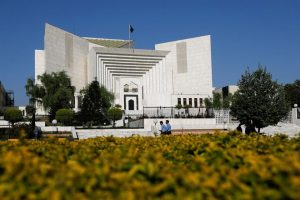SC told PR that they had leased out 10,750 acres of land. PR lawyer withdraws business plan for utilizing business lands, stating ministry will create policy for govt permission.

ISLAMABAD: While permitting Pakistan Railways to lease land for public use, the Supreme Court also decided that the department could use its vacant land for a variety of uses without harming its original nature in order to raise money.
A three-member panel led by Chief Justice of Pakistan Umar Ata Bandial heard the railways’ request for a review of the order from the top court from June 14, 2021, which stated that no part of the department’s land could be sold, transferred, leased, or given to a private party and that all PR land must only be used for those purposes.
The chief justice had stated at the hearing on Thursday that conducting business was not the role of the state. “It has been demonstrated that state agencies should not become mired in private businesses everywhere in the globe, including Pakistan,”
He continued, “We have the Pakistan Steel Mill, PIA, and other organisations before us as models.
He stated, “State institutions are in deficit; initiatives, including PIDCs, are lost due to turnover,” and added that any government agency choosing to launch a business endeavour must first obtain approval from the federal government and parliament in order to establish a legal regulatory environment.
The court stated that of the 169,128 acres of property, 126,426 acres were being used for operational reasons, 16,742 acres were being set aside for future growth, 9,985 acres were being occupied by encroachers without permission, and 10,750 acres were being leased for a variety of uses.
The secretary of the PR Board told the court that although the department was earning Rs2.5 billion a year by leasing out various parcels of property to private parties, it needed the court’s approval to give leases for longer periods of time.
How much damage had the recent floods caused to Pakistan Railways? Justice Ijazul Ahsan questioned. The chief justice said that the railways failed to specify their revenues, costs, and losses in the business plan.
PR is asking the court to take note of the fact that, in addition to using the land’s potential to generate income for the organisation and the state, such a sizable stretch of land—6,000 acres—requires maintenance and protection from encroachments.
In its order, the court stated that although PR had set grandiose goals in its business plan for commercialising its land, the court was unconcerned with these goals since it had the necessary knowledge to assess their practicality.
According to the order issued by CJP, PR must have legal authorization to carry out development programmes or recommendations from the forums (parliament) that permit such use.
According to the secretary of railroads, the railways will take its portion of each property lease if the court permits.
Meanwhile, PR’s attorney, Barrister Zafarullah Khan, withdrew the business plan he had submitted to the top court for using railroad lands, stating that the Ministry of Railways would develop a plan that would need to be approved by the cabinet and parliament in order to be a proper statute or set of rules.
The court then postponed additional proceedings until March.










































